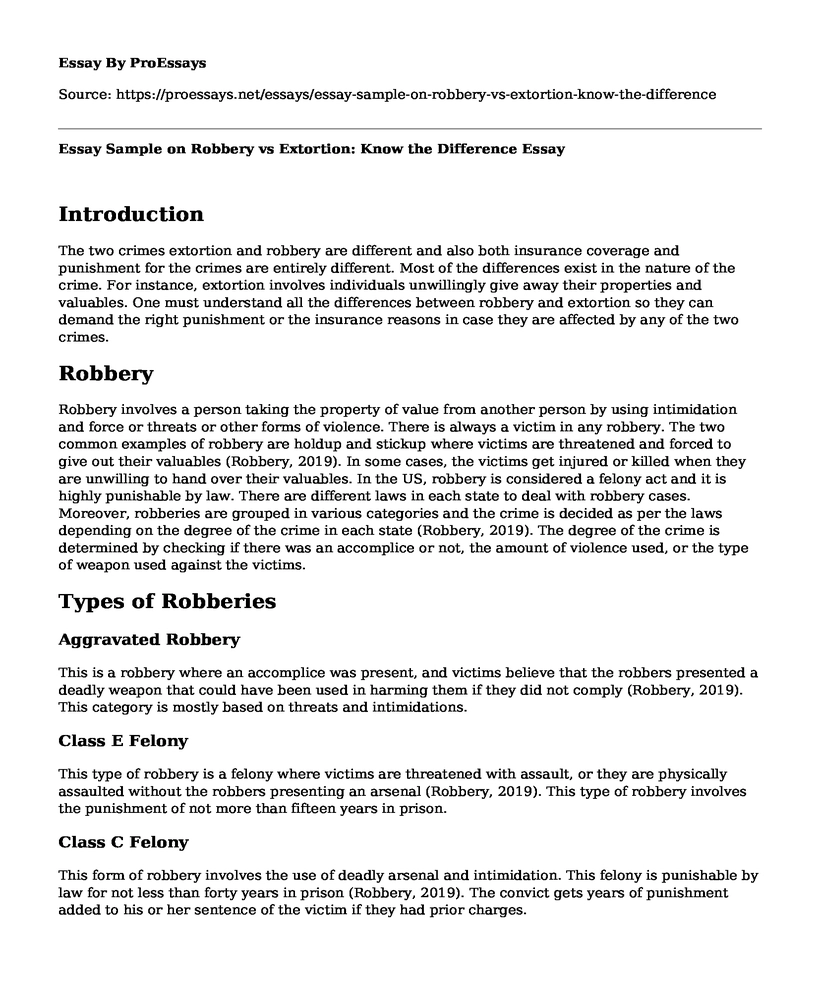Introduction
The two crimes extortion and robbery are different and also both insurance coverage and punishment for the crimes are entirely different. Most of the differences exist in the nature of the crime. For instance, extortion involves individuals unwillingly give away their properties and valuables. One must understand all the differences between robbery and extortion so they can demand the right punishment or the insurance reasons in case they are affected by any of the two crimes.
Robbery
Robbery involves a person taking the property of value from another person by using intimidation and force or threats or other forms of violence. There is always a victim in any robbery. The two common examples of robbery are holdup and stickup where victims are threatened and forced to give out their valuables (Robbery, 2019). In some cases, the victims get injured or killed when they are unwilling to hand over their valuables. In the US, robbery is considered a felony act and it is highly punishable by law. There are different laws in each state to deal with robbery cases. Moreover, robberies are grouped in various categories and the crime is decided as per the laws depending on the degree of the crime in each state (Robbery, 2019). The degree of the crime is determined by checking if there was an accomplice or not, the amount of violence used, or the type of weapon used against the victims.
Types of Robberies
Aggravated Robbery
This is a robbery where an accomplice was present, and victims believe that the robbers presented a deadly weapon that could have been used in harming them if they did not comply (Robbery, 2019). This category is mostly based on threats and intimidations.
Class E Felony
This type of robbery is a felony where victims are threatened with assault, or they are physically assaulted without the robbers presenting an arsenal (Robbery, 2019). This type of robbery involves the punishment of not more than fifteen years in prison.
Class C Felony
This form of robbery involves the use of deadly arsenal and intimidation. This felony is punishable by law for not less than forty years in prison (Robbery, 2019). The convict gets years of punishment added to his or her sentence of the victim if they had prior charges.
Extortion
Extortion involves a person being forced by another in doing something against their will by threatening the person's property of their reputation. Sometimes it involves the use of violence, hardship, or financial damage. Often, there is a use of money like racketeering or blackmail, where the victim unwillingly consents to do the bidding of another person (KATZ, 2013). The punishment of extortion is often imprisonment or fine and sometimes both, but it depends on the state since each state has different laws. When a public officer commits the felony of extortion, the punishment often includes office forfeit.
The difference between the two crimes is that there is an immediate threat to the victim in the robbery but victims in extortion often willingly give away their valuables or properties to avoid damage or violence, which involves both immediate and future threats (Asal, Rethemeyer, & Schoon, 2019). Valuables are often taken from victims without their consent in a robbery but in extortion, they often unwillingly give away their valuables.
Conclusion
Robbery and extortion are two different felonies, and therefore their punishments are different. However, the type of punishment depends on the degree of the crime and the law of the particular state. Robbery basically involves a person forcefully taking valuables of other people without their consent, while extortion involves a person taking valuables of other people with their consent, although they unwillingly give away their properties.
References
Asal, V. H., Rethemeyer, R. K., & Schoon, E. W. (2019). Crime, Conflict, and the Legitimacy Trade-Off: Explaining Variation in Insurgents' Participation in Crime. Journal of Politics, 81(2), 399-410. https://doi.org/10.1086/701492
KATZ, L. (2013). Spite and Extortion: A Jurisdictional Principle of Abuse of Property Right. Yale Law Journal, 122(6), 1444-1482. Retrieved from http://search.ebscohost.com/login.aspx?direct=true&db=asn&AN=87399291&site=ehost-live
Robbery. (2019). Columbia Electronic Encyclopedia, 6th Edition, 1. Retrieved from http://search.ebscohost.com/login.aspx?direct=true&db=asn&AN=134490855&site=ehost-live
Cite this page
Essay Sample on Robbery vs Extortion: Know the Difference. (2023, Mar 26). Retrieved from https://proessays.net/essays/essay-sample-on-robbery-vs-extortion-know-the-difference
If you are the original author of this essay and no longer wish to have it published on the ProEssays website, please click below to request its removal:
- Forensic Psychology in Child Custody
- Argumentative Essay on Police Use of Body-Worn Cameras in Criminal Justice
- Ethos, Pathos, and Logos in 'Letter From Birmingham Jail' Essay
- Essay Sample on Serial Killer: Dr. Henry Howard Holmes
- Correctional Case Managers: Transforming Inmates for a Smooth Transition to Society - Esssay Sample
- Paper Example on Security Studies and International Relations
- Paper Example on Reconstruction in America: Rebuilding After Civil War & WW2







